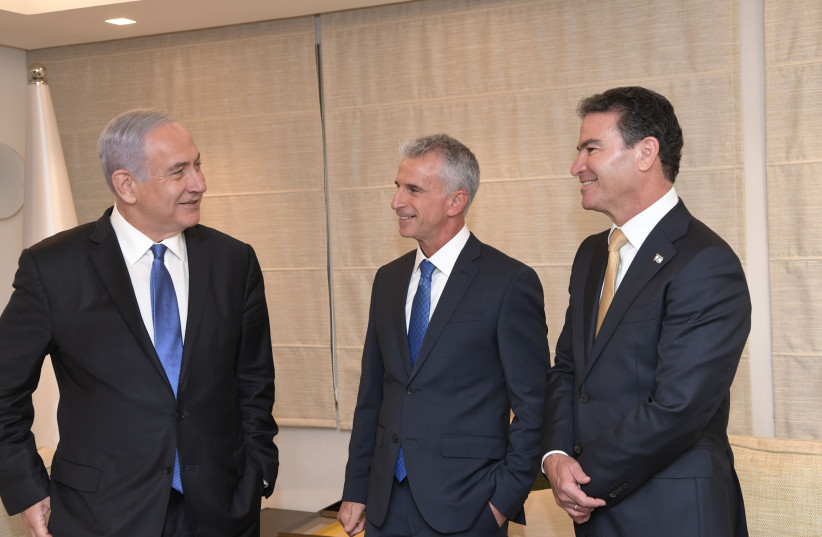Three Mossad chiefs have fought about issues related to the Iran nuclear deal over the last decade in visits to Washington.
Tamir Pardo in 2012, before the interim deal that led to the 2015 JCPOA full nuclear deal was signed; Yossi Cohen in April 2021, in the heat of America's first round of negotiations to return to the deal; and David Barnea on Tuesday, with a return to the JCPOA expected at any moment.
Each of these trips had different purposes, led to different mixes of meetings and went very differently.
In fact, if there is any rule about Mossad chief visits to Washington at critical moments on Iran policy, it is that there are no rules.
Pardo’s visit was nominally kept a secret and was only leaked by CIA director David Petraeus as part of his testimony to the US Congress about Iran.

Cohen’s visit was passively leaked by Israeli sources to the Israeli media, with the visit itself morphing in its importance in real-time.
Barnea’s visit was officially announced by Prime Minister Yair Lapid’s office with ceremony only days after Lapid’s office approved the leak of comments that Barnea made to him criticizing US handling of the Iran issue.
Pardo's visits
When then-prime minister Benjamin Netanyahu sent Pardo, he was hoping to achieve an Iranian nuclear surrender, prevent a “bad deal” and impress the US with the idea that time was running out for sanctions or a military strike on the Fordow nuclear facility, which was becoming harder to deal with militarily.
However, as multiple leaks of Pardo’s comments to different groups in the US later made clear, he may not have been Netanyahu’s best messenger on this issue.
Pardo did not and does not view Iran as an “existential” threat the way Netanyahu does, even though he views it as a grave threat.
Further, Pardo was bothered by holes in what eventually became the JCPOA, but he viewed no deal as a worse scenario and actively opposed the Trump administration’s exit from the deal, which Netanyahu viewed as a crowning achievement.
So Pardo probably delivered some talking points to Petraeus that Netanyahu wanted delivered, but not likely much more than that.
He certainly fit into Netanyahu’s broader campaign, which scared Iran into cutting a deal, but Pardo was not a driver of the policy.
2021 Cohen visit
Cohen’s visit was a bizarre series of zigzags.
Originally, he had hoped to visit in February 2021 to squash the idea of returning to the JCPOA in the cradle before it could mature.
But the Biden administration refused to receive him until late April 2021.
By the time Cohen visited, a variety of other Israeli officials were also visiting.
It seemed like his role as Iran project manager was being supplanted by National Security Council adviser Meir Ben Shabbat.
But then Cohen surprised everyone by netting a full hour meeting (not scheduled) with US President Joe Biden himself.
Being that Biden refused to meet Netanyahu, Cohen would be the only Israeli to meet directly with Biden from January 2021 until Naftali Bennett met with him as prime minister seven months later in August.
Coincidentally or not, shortly after Cohen met with Biden, the US seemed to take some tougher stances on some issues, including advanced centrifuges, non-nuclear sanctions and seeking post-JCPOA negotiations for a “longer and stronger” deal.
Whether related or not, Iran decided not to negotiate on these terms, which pushed off negotiations until the end of 2021.
The terms of the current expected deal show Washington conceding on most of the issues it took a tough stand on in May 2021. But it may be that Cohen – along with the election of Iranian President Ebrahim Raisi – had a hand in delaying the deal for more than a year.
Cohen made no public comments before or after the visit, but the outcome would have been Netanyahu’s best-case scenario in spring 2021.
Barnea takes center stage
Barnea is coming in with the loudest objection and public footprint.
But he is also coming in with the weakest hand.
If with Pardo, the interim deal was months away, and with Cohen, the return to a deal was clearly something that could be postponed, Barnea seems to have jumped in at a moment when the train has left the station.
This does not mean that he will not be able to improve some terms of the deal or achieve some additional military or intelligence assistance from the US as consolation for the deal.
But he is not expected to get a meeting with Biden or nix or even delay anything significantly.
In fact, it seems Lapid is mostly sending Barnea to be the “bad cop,” so he can be the “less-bad cop,” and talk about criticizing the deal but maintain good relations at a time when Netanyahu would be breaking all the dishes or taking a jack hammer to them.
And that is possibly the one consistent purpose of sending a Mossad chief to Washington.
The Mossad chief’s mission can be molded to whatever the prime minister at the time needs, helped by nearly complete control over what the public hears or does not hear about the visit and the lack of protocol that spy chiefs must follow when moving in the shadows.
